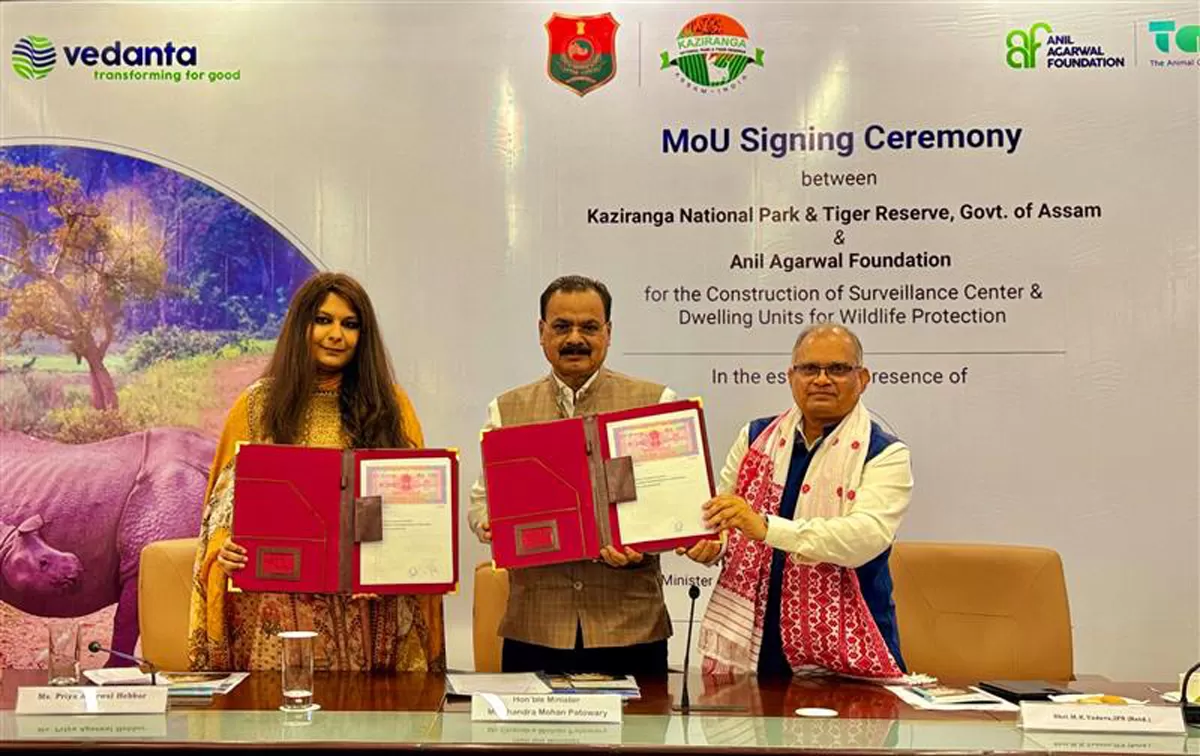On International Day for Biodiversity, Vedanta, India’s only critical minerals, energy transition metals, power, oil & gas and technology company, reaffirms its commitment to protecting & preserving biodiversity. The company’s Rajasthan based subsidiary, Hindustan Zinc, has signed an MoU (memorandum of understanding) with Department of Forest, Udaipur to rejuvenate Baghdarrah crocodile conservation reserve. With an investment of Rs 50 million, this initiative marks a significant step in public-private partnership for ecological restoration and aims to transform the nearly 400-hectare reserve into a thriving habitat for marsh crocodiles.
Nestled in the Kaladvas Gram Panchayat of Udaipur, Rajasthan, the Baghdarrah Conservation Reserve, a home to 200 avian species, is a biologically rich area centered around a perennial lake. Vedanta’s multi-dimensional development strategy encompasses a wide range of conservation, infrastructure, and community-oriented activities. The initiative focuses on restoring the natural habitat for crocodiles through afforestation, water conservation infrastructure like check dams and ponds, and the development of eco-sensitive visitor zones including walking trails, shelters, and educational exhibits. This initiative is in line with the company’s focus on UN SDG 15 (Life on Land) and aligns with this year’s theme of ‘Harmony with Nature and Sustainable Development’.
Vedanta has been at the forefront of safeguarding wildlife through its flagship animal welfare project, The Animal Care Organization (TACO). With a 24x7 veterinary hospital, shelter for abandoned and stray animals and Animal Birth Control Centre in Faridabad (Haryana), TACO offers advanced animal healthcare, preventive veterinary care, a spay & neuter program, diagnostics, and mobile emergency care.
Under TACO’s wildlife conservation initiative, ‘Mission Vanraksha’, strategic partnerships with Kaziranga National Park in Assam for the conservation of the majestic one-horned rhino, as well as with Ranthambore National Park and Ramgarh Vishdhari Tiger Reserve in Rajasthan. These collaborations strengthen conservation efforts through measures such as anti-poaching camps, deployment of surveillance vehicles, and provision of dwelling units for frontline workers, among others.
Priya Agarwal Hebbar, Non-Executive Director of Vedanta, said, “Biodiversity is the heart of our planet, and every creature, from the smallest butterfly to the majestic tiger, plays a vital role in its rhythm. Through TACO and our conservation initiatives, we’re protecting ecosystems and building a future where animals and communities thrive together. Our partnerships with iconic sanctuaries like Ranthambore and Kaziranga reflect our deep commitment to nurturing nature’s delicate balance.”
Vedanta has undertaken various initiatives across its business units to conserve biodiversity such as conducting massive afforestation drives, reclaiming wasteyards into flourishing greenbelts and undertaking Miyawaki plantation (high density, fast-growing afforestation) drives. In Rajasthan, Hindustan Zinc has initiated the second phase of transformation of 16 hectares of wasteland at the Chanderiya Lead-Zinc Smelter into a flourishing greenbelt. By leveraging Mycorrhiza technology, in collaboration with The Energy and Resources Institute (TERI), Hindustan Zinc is enhancing biodiversity and protecting natural ecosystems around its operational units. In Goa, the company’s subsidiary, Sesa Goa has reclaimed the Sanquelim Mines, spanning 200 hectares, by fostering the growth of native species and medicinal plants through agroforestry, thereby supporting local communities. Vedanta Aluminium’s Biodiversity Park in Jharsuguda, Odisha, dazzles with over 30 butterfly species and its Avian Arena Park in Lanjigarh, Odisha, provides birds safe places to nest and bird baths. Cairn Oil & Gas’s 86-acre man-made mangroves at Ravva, Andhra Pradesh shelters 150 bird species, Smooth-Coated Otters and the endangered Fishing Cat. In Rajasthan, Cairn has conducted habitat identification and awareness sessions for the Spiny-Tailed Lizards. In FY24, the company planted over 2 million trees since FY21 and aims achieve the goal of planting 7 million trees by 2030 in alignment with the World Economic Forum’s Trillion Tree initiative.
Vedanta has been a pioneer in adopting innovative technologies and targeted initiatives to reduce greenhouse gas (GHG) emissions, enhance water positivity, recycle waste, and foster biodiversity. The company continues to plan and strive to achieve no net loss of biodiversity at all operational sites and has completed biodiversity screening for 100 per cent of its 52 operational assets thereby successfully establishing a biodiversity baseline.




















